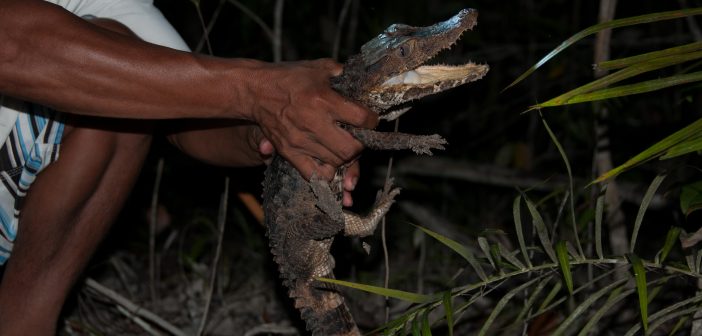Dr. Simon Pooley, a specialist in human-wildlife conflict at Birkbeck, University of London, is calling for a fundamental rethink of how we study and manage human-predator relations, particularly where conflicts have emerged over damage caused by animals like crocodiles, jaguars, lions, tigers and wolves.
Dr. Pooley has been working with a select group of experts from diverse fields, including anthropologists, conservation biologists, critical social scientists, geographers and environmental historians, who have just published a position paper in Conservation Biology (Pooley et al. 2017). This interdisciplinary group recognise that many scientifically-devised measures to prevent conflict have either failed or been discontinued because solutions have not taken into account the specific local relationships between animals and people, or the different priorities of locals, conservation managers and international NGOs. They are calling for greater cooperation between academics working in different disciplines, and managers and local stakeholders, to address this.
Thousands of people are involved in adverse encounters with predators every year, with many more suffering economic hardship resulting from loss of livestock and the costs of having to guard livestock. Dr. Pooley says: “Local populations’ experiences and understanding of encounters with predators can vary greatly from the understanding of conservation scientists. If local customs, beliefs and conditions are not taken into account in policy development then measures implemented can have only limited success”.
He gives as an example research on jaguars in Brazil by his co-author Alexandra Zimmermann at Oxford’s Wildlife Conservation Research Unit: “Conservationists assumed that jaguars were being hunted by local populations because of the monetary impact of loss of livestock and so implemented measures to address this. They later realised that the driving force was the prestige associated with hunting.”
Many conservation policies fail because they don’t involve local people. These people may lack the knowledge, time or resources to engage in formal politics or lobbying, but can still send a strong message of discontent with conservation policies ‘imposed’ on them by distant policy-makers through covert actions – such as killing predators. Taking into account the views of these groups during policy planning could mitigate this situation and address what Dr. Pooley and his co-authors recognise is sometimes actually human-human conflict. Here, the animals come to be perceived as ‘owned’ or ‘controlled’ by a particular group (such as conservationists trying to repopulate an area adjacent to one inhabited by humans).
Equally, the fact that predators have been able to survive in some areas may be due to the fact that the local population tolerates them and has learned to coexist with them – rather than to legal enforcement or the social engineering of behaviour by conservationists. Because of this, Dr. Pooley and colleagues argue that human-predator conflict should actually be reframed as a subset of human-predator relations in recognition of the fact that attacks are not always viewed by locals as being ‘conflictual’, but rather ‘facts of life,’ or even in some cases as a version of divine judgement for immoral acts. Attempting to intervene to resolve perceived conflicts can polarise the situation and associate the animals with conservationists or local authorities.
Dr. Pooley adds: “Until now, attempts to manage human-predator relations have been based on an overly compartmentalised approach to a complex issue. Further, pressure to find quick, win-win solutions has favoured technical fixes aimed at reducing impacts, obscuring the underlying drivers of conflicts.
“Unless we are able to harness the knowledge and skills of researchers across the disciplines, not only on the numbers, locations and outcomes of predator attacks – but also on the histories, cultures and economies of the humans affected, and on how particular communities of humans and predators interact – we will be unable to provide a sound basis for interventions which will improve outcomes both for people and animals.”
__
About Birkbeck, University of London
Founded in 1823, Birkbeck, University of London, is a world-class research and teaching institution, a vibrant centre of academic excellence and London’s only specialist provider of evening higher education. Our evening teaching allows students to progress their life goals during the day, through work, volunteering or internships.
Birkbeck is recognised as one of the world’s leading universities for excellence in research and teaching. The Times Higher Education World University rankings 2015-16 placed Birkbeck among the world’s top 250 universities, while the 2014 Research Excellence Framework saw Birkbeck placed 30th in the UK for research, with 73% of our research rated ‘world leading’ or ‘internationally excellent’.
__
(Featured image: young wild caiman captured and held in the Amazon rainforest. Credit uh whatever, CC BY-NC-ND 2.0)





